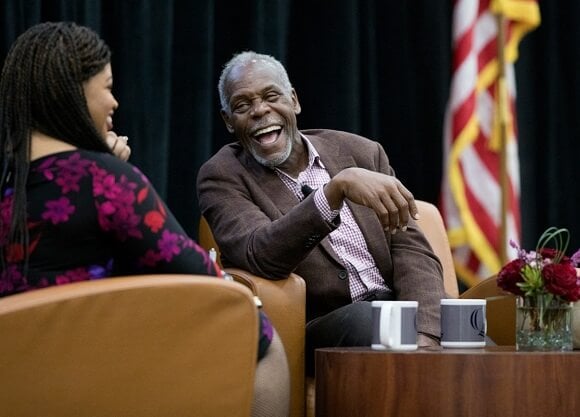
Actor Danny Glover reflects on the writings of Frederick Douglass
February 07, 2018

February 07, 2018

The candid and insightful Glover, best known for his film roles in “The Color Purple” and the “Lethal Weapon” franchise, discussed the fight for civil rights and social justice February 6 during a program titled, “From Abolition to #BLM: A Conversation with Danny Glover,” with about 600 people at Burt Kahn Court on our Mount Carmel Campus.
“It’s pretty obvious when we look at what’s happening today, it’s relevant, not only as we look at the issues around race that are happening in this country, but the issues around race that are happening in the rest of the world,” Glover said. “Are the people of color the ones who are the most vulnerable and the most marginalized in this system of capitalism? Of course they are. It’s historic.”
As the keynote speaker for Black History Month, Glover talked with Khalilah Brown-Dean, associate professor of political science, about the arts as a platform for change in America. He spoke fondly of his friendship with singer and actor Harry Belafonte, a longtime civil rights advocate. He also quoted Paul Robeson, the groundbreaking actor, activist and son of an escaped slave who said, “Artists are the gatekeepers of truth.”
Glover’s appearance commemorated the 200th anniversary of the birth of Douglass. During one point in the program, Brown-Dean read an especially eloquent quote by Douglass: “Power concedes nothing without a demand. It never has and it never will.” She followed the quote with a question to Glover: “What is it that we should be demanding and for whom?”
Glover didn’t hesitate with his response: “It’s always been to demand truth and justice for all people.”
One of the most stirring moments of the program came when Glover read from the prescient and provocative Douglass speech, “The Meaning of July Fourth for the Negro.” Douglass delivered the speech in Rochester, New York, on July 5, 1852.
Glover’s dramatic oration hinted at what Douglass might have sounded like that summer day in upstate New York:
“The conscience of the nation must be roused. The propriety of the nation must be startled. The hypocrisy of the nation must be exposed, and its crimes against God and man must be proclaimed and denounced. … Your celebration is a sham, your boasted liberty an unholy license. … There’s not a nation on the Earth guilty of practices more shocking and bloody than are the people of the United States at this very hour.”
After the program, Brown-Dean reflected on the meaning and the impact of Glover’s message.
“How do we reduce that gap between the principle of democracy and our everyday practice?” Brown-Dean asked. “With that backdrop celebrating Frederick Douglass and his 200th birthday, to have a contemporary artist and activist link that together, then the challenge is on us. The gauntlet has been thrown. What do we do with that?”
In February, Ireland’s Great Hunger Institute opened a yearlong exhibition titled “Frederick Douglass in Ireland: “The Black O’Connell,” which focuses on the time Douglass spent in Ireland from 1845-46 and his enduring relationship with that country. The exhibition is free and open to the public in the Lender Special Collection Room in the Arnold Bernhard Library. Visit ighm.org for hours and for more information.
Quinnipiac Today is your source for what's happening throughout #BobcatNation. Sign up for our weekly email newsletter to be among the first to know about news, events and members of our Bobcat family who are making a positive difference in our world.
Sign Up Now